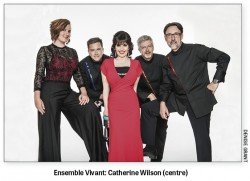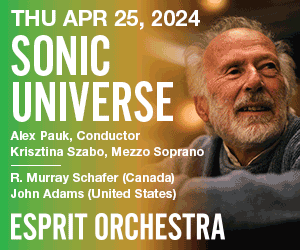![]() That “Music heals” – if not the body then at least the soul – is one of the most popular sayings about the power of music; its benefits oft-touted to prove the good that it can do for its listeners and practitioners.
That “Music heals” – if not the body then at least the soul – is one of the most popular sayings about the power of music; its benefits oft-touted to prove the good that it can do for its listeners and practitioners.
But it doesn’t though – at least, not always. Like any physically and emotionally demanding experience, music can put an enormous strain on the bodies and minds of the people who make it. For many, a career in music can lead to serious stresses – stresses that often don’t get talked about. It’s time, for performers and listeners alike, to begin a dedicated conversation about how music can heal and help people – and on the other end, how people doing musical work can exercise the self-care necessary for keeping a life in music from becoming harmful.
 Ensemble Vivant is one group that makes the connection between music and health an intimate and integral part of its work. Founded and headed by pianist Catherine Wilson, the group is a pioneer on the piano-chamber music scene, culling its repertoire from both classical and jazz worlds. It’s also the flagship ensemble for Wilson’s not-for-profit Euterpe – an organization that conducts research on the healing effects of exposure to live concert performances, and provides musical opportunities based on that research for children and communities in need.
Ensemble Vivant is one group that makes the connection between music and health an intimate and integral part of its work. Founded and headed by pianist Catherine Wilson, the group is a pioneer on the piano-chamber music scene, culling its repertoire from both classical and jazz worlds. It’s also the flagship ensemble for Wilson’s not-for-profit Euterpe – an organization that conducts research on the healing effects of exposure to live concert performances, and provides musical opportunities based on that research for children and communities in need.
Ensemble Vivant’s current project is “Christmas Tidings,” a month-long tour from November 27 to December 23, to ten cities across Southern Ontario. The music itself is a variety of seasonal repertoire, much of it adapted from the ensemble’s 1992 album of the same name. What makes this particular tour stand out from other holiday shows, however, is its incorporation of Euterpe initiatives. At each concert, the ensemble will be collaborating side by side with a different children’s choir, providing guidance as well as professional performance and rehearsal opportunities for local students.
Wilson is the driving force behind this initiative, and with good reason. “Playing in a community band in junior high school provided a safe haven, allowing me to escape from an extremely strife-ridden background,” she says. “The band was family for me and planted the seeds for my love of chamber music.” Wilson goes on to explain that for her, a key goal of Euterpe, and of the work that Ensemble Vivant does alongside it, is ensuring that those who otherwise wouldn’t have access to high-calibre concert experiences get the same types of music-making and concertgoing opportunities that made such a difference in her own life.
In terms of her own life in music today, Wilson recognizes the health threats of performing professionally, but maintains that seeing the healing benefits of music in action through her Euterpe research and performances provides ample motivation for seeking and finding solutions.
“There are a variety of physical stresses to being a concert pianist. Staying healthy physically, avoiding injuries and not becoming too worn down is always a challenge,” Wilson explains. “I swim regularly and see a top physiotherapist. I have endured several long-term setbacks over the years…yet it is music that has always been my main source of psychological strength. Industry stresses, physiological and psychological stresses notwithstanding, the music-making is a labour of love…and is what excites us and keeps us healthy. Giving through music is healing and enriching for our audiences, as well as for us.”
Ensemble Vivant’s tour begins in Orillia on November 27 and travels across the province, wrapping up on December 23 in Ottawa with the Cross Town Youth Chorus. For details on the tour, visit ensemblevivant.com.
Artist’s Health: I first visited the Artists’ Health Centre this summer, when a sudden change in my work schedule led to a minor injury in my wrist. Becoming aware of the services and the resources they offer for artists of all disciplines has been hugely helpful – both for managing the healing of my own injury and for navigating how musicians can become more open generally about challenges with mental and physical health.
Based out of Toronto Western Hospital and run in partnership with the Artists’ Health Alliance, the Al and Malka Green Artists’ Health Centre is a clinic offering both medical and complementary care for professional artists. Patients must self-identify as creative professionals and meet at least one of the centre’s requirements for what constitutes being a professional artist. Services include acupuncture, chiropractic medicine, craniosacral therapy, registered massage therapy, physiotherapy, psychotherapy (for individuals and in groups) and shiatsu therapy – all with a special focus on accommodating the career paths, lifestyles and income levels of professional arts workers.
Susannah McGeachy, the clinic’s nurse practitioner, is typically a musician’s first one-on-one contact with the Centre. Her job, which includes assessing the client’s needs, referring them to other centre professionals and giving them interim guidance on how to manage their condition, means that she sees a lot of different professional musicians – with a lot of different complaints.
“I deal with a wide variety [of issues], but there are certainly recurrent themes,” says McGeachy. “I would say that generally, soft tissue injuries are pretty common – things like sprains and strains that aren’t always allowed to rest and heal the way that they need to because of the demands of a musician’s professional practice. Things like chronic tendinitis – broadly, we call them overuse injuries, where you can get inflammation and damage from using a very small muscle group to do the same kind of motion again and again, many times. Another thing that comes up often is the challenges that musicians face around mental health and anxiety, sometimes associated with what I call being in ‘constant evaluative situations’ like auditions and performances, with a certain level of career unpredictability.”
With the level and volume of issues that McGeachy sees, it’s clear that our music industry needs to change – both in the way it employs musicians and in the stigmas in the performing arts around prioritizing self-care. “I know it’s a complex thing,” McGeachy says, “but I think that with performance and rehearsal scheduling, more attention and awareness needs to be paid to the physical demands on the musicians – who are often performing a lot of very different repertoire in a short period of time, and having these ‘bursts’ where there’s a lot of physical demand, both in terms of the pieces themselves and the travelling that musicians have to do. I think with orchestras, for example, and even sometimes in educational institutions, the work happens with much more regard to venues, conductor availability, and things like that – but it doesn’t always seem like there’s an eye on getting a good balance of repertoire – physically – and giving the musicians rest and recovery time.
“There’s this idea in the music industry,” McGeachy continues, “that it’s important to play as many gigs as you can, and that however those fall, the musicians are just sort of expected to rise to the challenge. And I think that systemically, that makes it very hard for individual musicians to know how to take good care of themselves.”
And as for advice to musicians, about how they can focus on self-care, and why it matters?
“Your body is your instrument as much as your instrument is your instrument,” says McGeachy. “If you think about the care and attention that a musician gives to making sure that their instrument is well-tuned and protected and not exposed to the elements...what I think musicians don’t always realize is that they are an even more intricately made instrument than the one that they’re playing. And that really to make a long-term career out of this work, it’s important to learn your body as early as possible. It’s about forming practices that will allow you to do what you love for as long as you want.
“Overall, I think the biggest message that I try to drive home with musicians is to learn to listen to their bodies,” she says. “To not play through pain. To break up practising into shorter sessions, especially if something hurts. And to warm up: I think that musicians often think of musical warm-up but not physical warm-up. Before playing, it’s important to do some physical warm-up to increase your heart rate and circulation – a brisk walk, jumping jacks, or a few flights of stairs. It sounds silly, but it’s pretty basic physiology – it decreases the risk of injury. And otherwise, musicians are people too, so doing the things that are good for everybody: regular exercise; a well-balanced diet; drinking lots of water; and doing things that you love, and promoting your own balance and mental health.”
McGeachy also mentions that her door is often open and that the Centre is always happy to see people (artistshealth.com) – so musicians, if you’re ever in need, be sure to look them up.
The potential for music-making to act as a healing experience for people – and the potential for a musical career to become mentally and physically unhealthy as well – is worth discussing. If you have your own story about music and self-care, as a musician, or as a listener, feel free to send it along, to editorial@thewholenote.com. I’m sure that there will be others who can relate.
I’ve dealt in the past with injury and anxiety, and it isn’t an easy subject to communicate about. I’ve known professional musicians who have neglected their well-being because they felt that self-care was fundamentally at odds with living in the service of their craft. I’ve known music students who have been reluctant to tell teachers about playing while hurt, because they were afraid to be seen as a liability within their studios. Unless performers and listeners keep having conversations about how music affects the minds and bodies of people, for better and for worse, it will remain difficult for people to recognize that self-care and musical commitment need not be at odds with one another. In fact, for many professionals, those two things make the most sense when they can feed off of one another.
Let’s get talking.
Sara Constant is a Toronto-based flutist and musicologist, and is digital media editor at The WholeNote. She can be reached at editorial@thewholenote.com.



